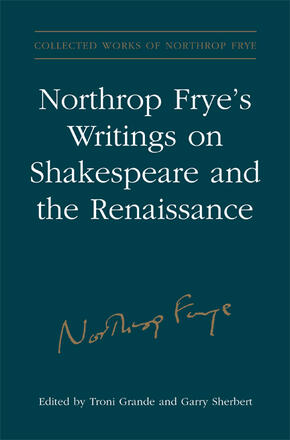
Description
This collection of Northrop Frye's writings on Shakespeare and the Renaissance spans forty years of his career as a university teacher, public critic, and major theorist of literature and its cultural functions. Extensive annotations and an in-depth critical introduction demonstrate Frye's wide-ranging knowledge of Renaissance culture, the pivotal place of the Renaissance in his oeuvre, his impact on Renaissance criticism and on the Stratford Festival, and his continuing importance as a literary theorist.
This volume brings together Frye's extensive writings on Shakespeare and other Renaissance writers (excluding Milton, who is featured in other volumes), and includes major articles, introductions, public lectures, and four previously published books on Shakespeare. Frye's insightful analyses offer not just a formidable knowledge of Renaissance culture but also a transformative experience, moving the reader imaginatively towards an experience of created reality.